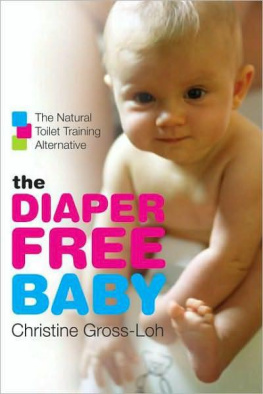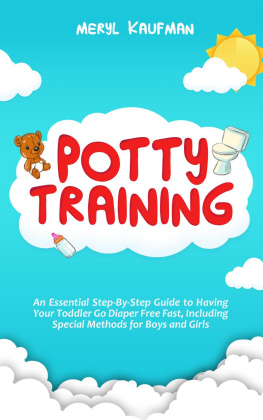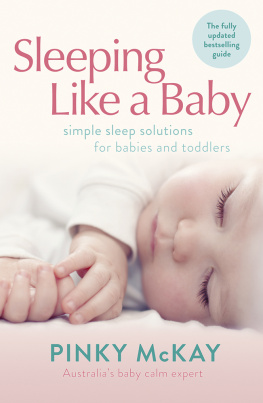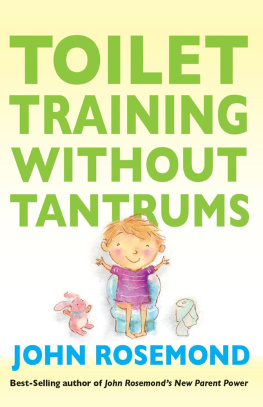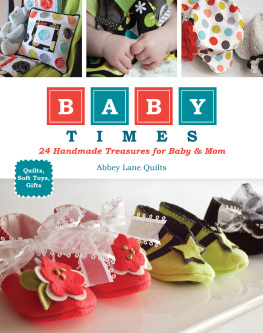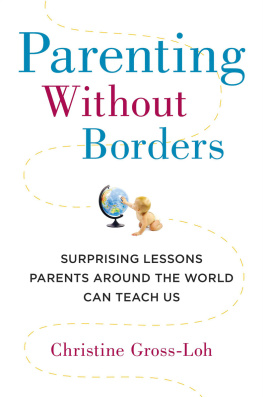
the DIAPER-FREE BABY
The Natural Toilet Training Alternative
Christine Gross-Loh

This book is dedicated to my two little
diaper-free babies, Benjamin and Daniel,
who, from the moment of birth,
opened my heart to all that babies
and children have to say to us.
CONTENTS
By Melinda Rothstein and Rachel Milgroom, cofounders of DiaperFreeBaby
We both entered motherhood expecting to change years of diapers, just like every parent we had ever known. Melinda thought of taking her one-week-old son to the bathroom when she knew he was about to go, but dismissed it immediately as ridiculous because shed never known anyone who did it. Rachel was dedicated to the idea that a child should be helped to learn to use the toilet at a young age, but thought that meant starting at around a year old and that anything younger would be impossible and incredibly messy. Only after being encouraged by other parents did we start to consider an alternative to full-time diapering.
What these other parents told us is this: Our babies are born ready to communicate that they need to use the potty, and the time spent taking a baby to the potty can be fun. Half of the worlds children are out of diapers by the end of their first year, yet many of the children in American society remain in diapers well into their third and fourth years. We learned that it is possible to practice elimination communication (EC) regardless of differences in work schedule or parenting stylefrom a few times per week to many times per day, one caregiver to many, starting at birth or starting later in the first year. We came to understand that parents in an exclusively diapering culture need assistance as they shift their mindsets about elimination and diapering.
Once we understood that babies are aware of their elimination needs and have ways of communicating those needs, it made perfect sense to us to help them use the potty. Both of us started our elimination communication journey with our children at approximately the same time as Christine did with her second son, Daniel. We influenced each others choices and provided support to each other as we learned. Through frequent contact via e-mail with other families we learned practical day-to-day tips and started a local playgroup for families practicing EC. From these relationships we learned about our infants innate intelligence and increased our ability to understand when they were communicating their needs.
At the time, none of us had any idea how much EC was going to add to our lives. We definitely had no inkling that wed be so enriched by it that wed become involved in the effort to publicize the practice to parents everywhere. The international EC support organization, DiaperFreeBaby, was born out of our desire to help other families meet for support and sharing. We knew that families would be happy to have a way to connect with each other, but we were completely surprised by the level of international media interest.
This growing interest makes it clear that it is time for Christines book, and were thrilled that so many parents will now have the opportunity to explore EC for their families. Christine is the perfect person to write this book, as she has both the loving perspective of an EC parent and the professional skill to present the information. From our first playgroup with Christine, her perspectives on elimination communication and parenting, as well as her own gentle nature, have been indispensable to us personally and to the parenting community as a whole. She has been totally committed to the social movement that has occurred since we started DiaperFreeBaby support groups, including the exponential growth of the New York City DiaperFreeBaby group that she started. Now she has written a book that is sure to inspire you to start practicing EC if you have not already begun.
Christine expertly shares real stories as well as practical tips and guidance for integrating EC into your family life. We hope that you will view this book as a DiaperFreeBaby meeting in your pocket and hope it will enrich your life as well.
Diapers. Were so used to thinking of them as the ultimate symbol of babyhood that the thought of a baby without diapers seems awfully strange. Its practically a rite of passage for parents to get their toddlers and preschoolers out of diapers. Advice abounds on getting your two-or three-year-old to ditch those diapers and begin to learn to go in a potty or toilet. The current trend is to let your child wait until he is ready, and as a result, many parents find themselves involved in power struggles with their toddlers and preschoolers day after day because they missed crucial earlier windows of opportunity. The average toilet training age in the United States is now at an all-time high at around three years old. It makes sense, actually, that after a couple of years eliminating exclusively in diapers, a child will be inclined to hang on to them as long as he can. How odd it is, in fact, that our society expects a child to change gears midstream and suddenly stop using the diaper as a toilet when he has been doing so all his life!
Believe it or not, your child was not born wanting to go to the bathroom in a diaper. Like other mammals, human babies are born with the instinct not to soil themselves. It is not a natural or pleasant feeling for them to sit in their own waste; they are born aware of the sensation of going to the bathroom. Even the tiniest newborn will give off signs before and while she goes to the bathroom. This book is going to teach you how to read those signs, how to respond to them, and how to engage in a process of joyful communication with your baby at a pace that feels right for your family, whether this means once a day or more often. Through elimination communication, or EC, your baby will benefit as you help her retain her bodily awareness and assist her with a basic biological need. The benefit for you? In addition to parenting a happier baby, youre likely to need fewer diapers overallgreat for your wallet and for the environment!
For those who have spent time with older babies or toddlers who seem oblivious to a dirty diaper, the idea that they are born with the instinct not to soil themselves may seem preposterous. Being sprayed by newborn pee and poop as soon as a diaper comes off during diaper changes are a common occurrence throughout a babys first weeks (another common rite of passage for most parents), but this happens less and less often as the baby grows older. Why? By putting our children in diapers and changing them only after they have gone, we condition our babies to use the diaper itself as a toilet!
Some people might think, so what? Isnt diapering a part of babyhood? Arent diapers a sign of progress, modernity, and affluence? Perhaps that would be so if we did not expect our little ones to stop using diapers at some point in the first few years of their lives. Since this is the case, many parents are faced with double work: training a child to go to the bathroom in a diaper, and then training her to stop doing that and use a toilet instead! This means twice as much work for parents and twice as much adjustment for the child. The later this getsespecially if youre waiting for all the signs of readiness described by conventional toilet training expertsthe more of an adjustment it can be for your child, and the more diaper changes, diapers, and diapering accessories youve gone through in the meantime. (If your child is training around age three, this means up to nine thousand diaper changes and diapers, over three thousand dollars in diapers alone [not to mention wipes and other accessories], and according to a New York Times article on elimination communication, a contribution to the twenty-two billion single-use, disposable diapers in U.S. landfills per year, to be exact!)
Next page
